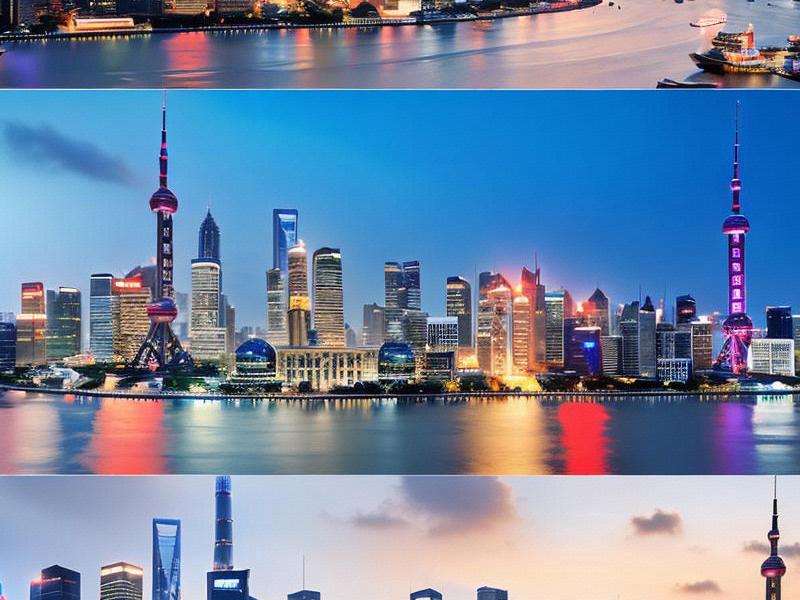
Shanghai, often referred to as the "Pearl of the Orient," stands as a beacon of modernity and progress in China. With its stunning skyline, vibrant cultural scene, and robust economic engine, Shanghai has emerged as one of the most dynamic cities in the world.
The city's history dates back centuries, but it was in the 20th century that Shanghai truly began to shine. After the opening of treaty ports in the late 19th century, Shanghai quickly became a major center for international trade and finance. The Bund, with its colonial-era architecture, stands as a testament to this era of rapid growth and transformation.
Today, Shanghai is a global financial hub, ranking among the top cities in the world for commerce, logistics, and finance. The city's Pudong district, once a rural area, has been transformed into a modern financial district housing some of the world's tallest skyscrapers, including the iconic Oriental Pearl Tower and the Shanghai Tower.
The economic success of Shanghai is not solely based on its financial sector. The city has also become a leader in innovation and technology. Zhangjiang Hi-Tech Park, often referred to as "China's Silicon Valley," is home to numerous high-tech companies, research institutions, and startups. This concentration of talent and resources has fueled Shanghai's growth in areas such as artificial intelligence, biotechnology, and information technology.
爱上海论坛 Culturally, Shanghai is a melting pot of tradition and modernity. The city boasts a rich history of art, literature, and architecture. The former French Concession, with its charming cobblestone streets and historic buildings, offers a glimpse into the city's colonial past. Meanwhile, the Shanghai Museum and the Power Station of Art showcase the city's contemporary art scene.
Shanghai's culinary scene is another highlight, blending traditional Chinese flavors with international cuisine. From the famous xiaolongbao (soup dumplings) in Nanxiang to the Michelin-starred restaurants in the city center, Shanghai offers a diverse and delectable dining experience.
The city's commitment to sustainability and urban development is also noteworthy. Shanghai has been at the forefront of green initiatives, investing in renewable energy, public transportation, and eco-friendly architecture. The Maglev train, which connects Pudong International Airport to the city center, is a testament to the city's focus on efficient and sustainable transportation.
Shanghai's international influence extends beyond its economic and cultural achievements. The city has played a pivotal role in China's integration into the global economy and its efforts to promote international cooperation. Hosting major international events such as the World Expo in 2010 and the G20 Summit in 2016 has further cemented Shanghai's status as a global city.
上海龙凤419贵族 The city's leadership in urban planning and development is also noteworthy. Shanghai has implemented innovative strategies to manage its rapid growth, including smart city initiatives and sustainable urban development projects. The Bund Riverfront, once a neglected industrial area, has been transformed into a vibrant public space with parks, promenades, and cultural attractions.
Shanghai's educational institutions are another source of pride, attracting students and researchers from around the world. Fudan University and Tongji University are among the top universities in China, offering a wide range of programs in science, technology, engineering, arts, and humanities.
The city's cultural festivals and events further enhance its global appeal. The Shanghai International Film Festival, one of the oldest and most prestigious film festivals in Asia, attracts filmmakers and audiences from around the world. The Shanghai Fashion Week, another major event, showcases the latest trends in fashion and design.
上海水磨外卖工作室 Shanghai's success story is not without challenges. The city faces issues such as housing affordability, traffic congestion, and environmental concerns. However, its proactive approach to addressing these challenges has set a benchmark for other cities worldwide.
The future of Shanghai looks promising, with continued investment in innovation, infrastructure, and sustainability. The city's leadership envisions Shanghai as a global center for technology, culture, and finance, playing a key role in shaping the future of China and the world.
In conclusion, Shanghai's journey from a traditional port city to a global metropolis is a testament to human ingenuity and determination. Its achievements in economic development, cultural preservation, and urban planning serve as an inspiration for cities around the world. As Shanghai continues to evolve, it remains a symbol of progress and a beacon of hope for the future.
